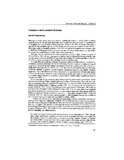| dc.contributor.author | Sebudubudu, D. | |
| dc.date.accessioned | 2012-03-14T07:11:23Z | |
| dc.date.available | 2012-03-14T07:11:23Z | |
| dc.date.issued | 2003 | |
| dc.identifier.citation | Sebudubudu, D. (2003) Corruption and its control in Botswana, Botswana Notes and Records, Vol. 35, pp. 125-139 | en_US |
| dc.identifier.uri | http://hdl.handle.net/10311/981 | |
| dc.description.abstract | Botswana is widely perceived as a succesful working democracy in Africa. What is striking about Botswana is that one party dominance over the past 36 years has not led to a proliferation of corruption as it did in most African countries. However, in 1994, Botswana established a specialised anti-corruption agency, the Directorate on Corruption and Economic Crime (DCEC), following a series of corruption scandals. The DCEC combats both corruption and economic crime i.e. thefts and frauds perpetrated on the public revenue. The focus of this article is on the DCEC, the reasons for establishing it, and the nature of its performance. | en_US |
| dc.language.iso | en | en_US |
| dc.publisher | Botswana Society | en_US |
| dc.subject | Corruption | en_US |
| dc.subject.lcsh | Corruption--Botswana | en_US |
| dc.title | Corruption and its control in Botswana | en_US |
| dc.type | Published Article | en_US |
| dc.link | http://www.jstor.org/stable/10.2307/40980345 | en_US |

